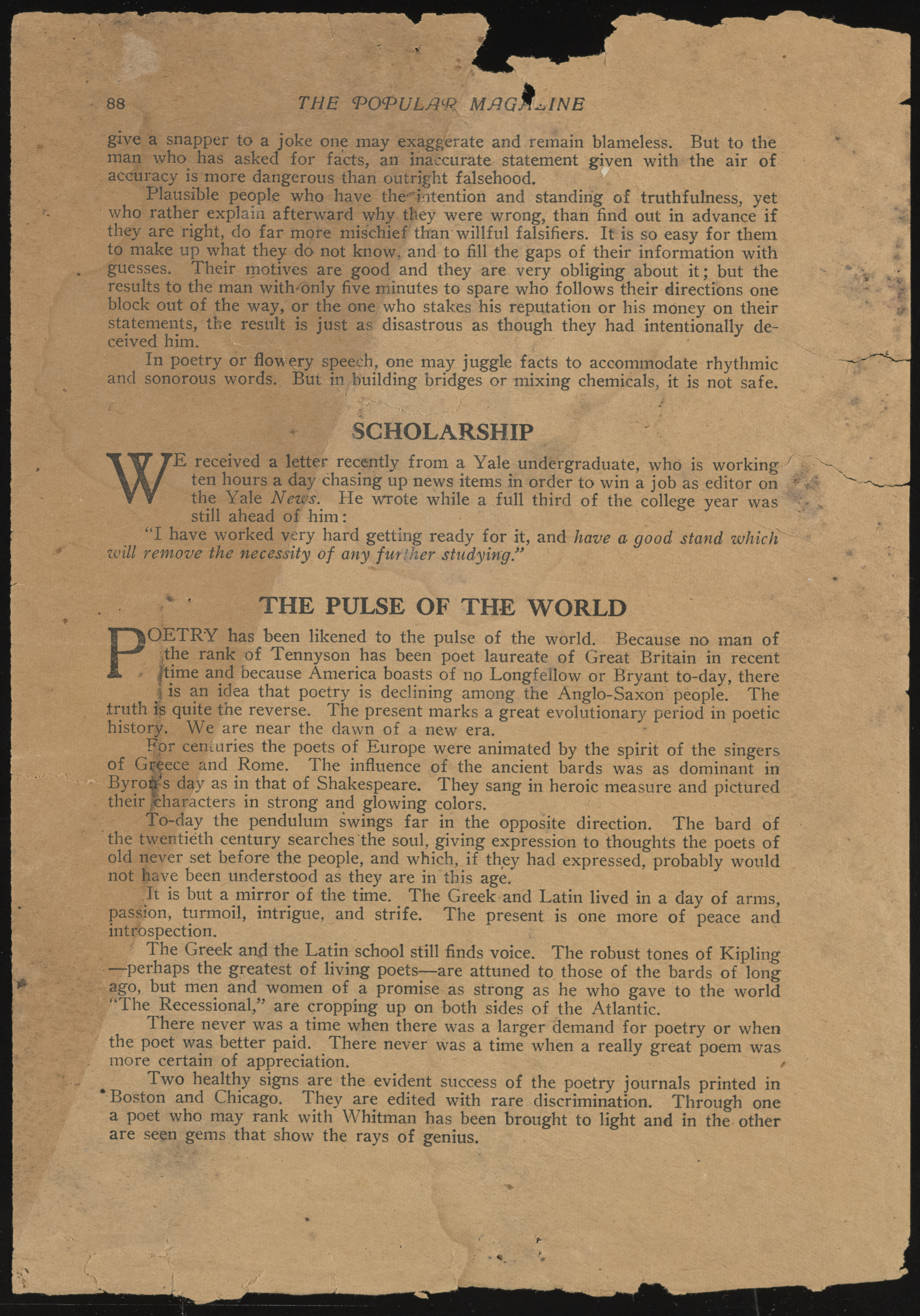Copyright & Fair-use Agreement
UNLV Special Collections provides copies of materials to facilitate private study, scholarship, or research. Material not in the public domain may be used according to fair use of copyrighted materials as defined by copyright law. Please cite us.
Please note that UNLV may not own the copyright to these materials and cannot provide permission to publish or distribute materials when UNLV is not the copyright holder. The user is solely responsible for determining the copyright status of materials and obtaining permission to use material from the copyright holder and for determining whether any permissions relating to any other rights are necessary for the intended use, and for obtaining all required permissions beyond that allowed by fair use.
Read more about our reproduction and use policy.
I agree.Information
Digital ID
Permalink
Details
Member of
More Info
Rights
Digital Provenance
Publisher
Transcription
88 THE ‘PO'PULJTR MAGAZINE give a snapper to a joke one may exaggerate and remain blameless. But to the man who has asked fo r facts, an inaccurate statement given w ith the air o f accuracy is more dangerous than outright falsehood. Plausible people who have the "intention and standing of truthfulness, yet who rather explain afterward why they were wrong, than find out in advance if they are right, do fa r more m ischief than* w illfu l falsifiers. It is so easy fo r them to make up what they do not know, and to fill the gaps of their inform ation w ith guesses. Their motives are good and they are very obliging about i t ; but the results to the man w ith'only five minutes to spare who follows their directions one block out of the way, or the one who stakes his reputation or his money on their statements, the result is just as disastrous as though they had intentionally deceived him. ; V-. In poetry or flowery speech, one may juggle facts to accommodate rhythm ic and sonorous words. But in building bridges or m ixing chemicals, it is not safe. > IN • £ ^ SCHOLARSHIP ? E received a letter recently from a Yale undergraduate, who is working ten hours a day chasing up news items in order to win a job as editor on the Yale News. He wrote while a fu ll third o f the college year was still ahead o f h im : “ I have worked very hard getting ready fo r it, and have a good stand whicli will remove the necessity of any further studying ” THE PULSE OF THE WORLD HO E T R Y has been likened to the pulse of the world. Because no man of jthe rank of Tennyson has been poet laureate o f Great B ritain in recent (time and because America boasts of no Longfellow or Bryant to-day, there j is an idea that poetry is declining among the Anglo-Saxon people. The truth is quite tne reverse. The present marks a great evolutionary period in poetic history. We are near the dawn of a new era. Ijb r centuries the poets of Europe were animated by the spirit of the singers o f Greece and Rome. The influence of the ancient bards was as dominant in B yrons day as in that of Shakespeare. They sang in heroic measure and pictured their Characters in strong and glowing colors. To-day the pendulum swings fa r in the opposite direction. The bard o f the twentieth century searches the soul, giving expression to thoughts the poets o f old never set before the people, and which, if they had expressed, probably would not have been understood as they are in this age. ,It is but a m irro r of the time. The Greek and Latin lived in a day of arms, passion, turm oil, intrigue, and strife. The present is one more o f peace and introspection. The Greek and the Latin school still finds voice. The robust tones of K ipling — perhaps the greatest of living poets— are attuned to those of the bards of long hut men and women o f a promise as strong as he who gave to the w orld “ The Recessional/’ are cropping up on both sides o f the Atlantic. There never was a time when there was a larger demand fo r poetry or when the poet was better paid. There never was a time when a really great poem was more certain of appreciation. / - Two healthy signs are the evident success of the poetry journals printed in Boston and Chicago. They are edited w ith rare discrimination. Through one a poet who may rank w ith W hitman has been brought to light and in the other are seen gems that show the rays o f genius.

